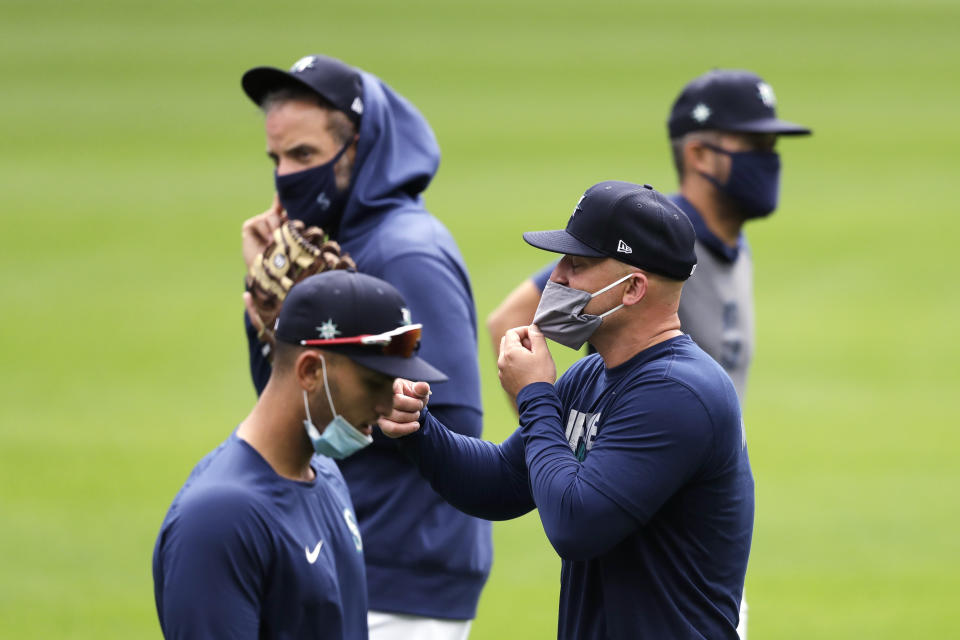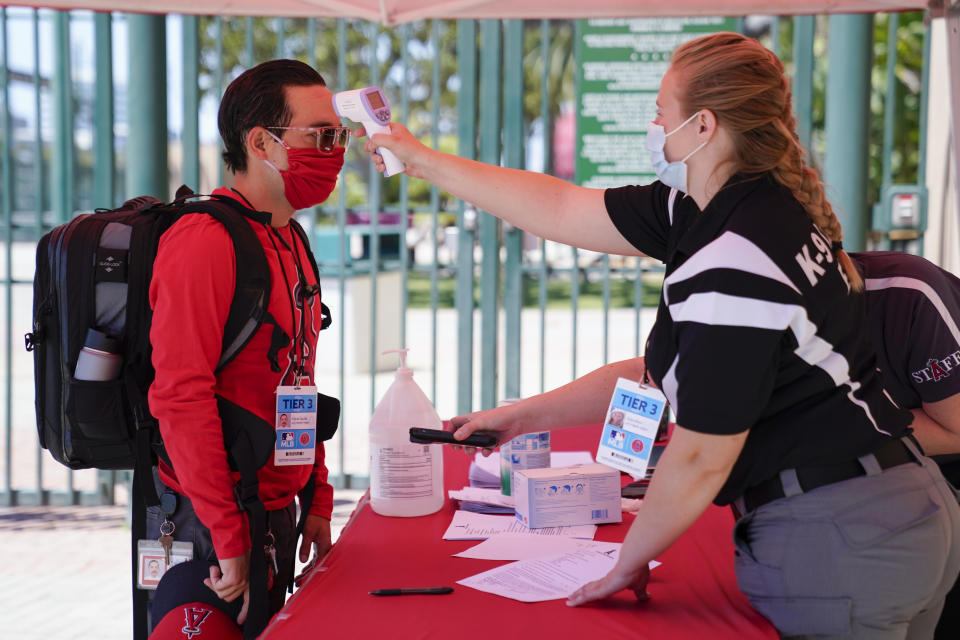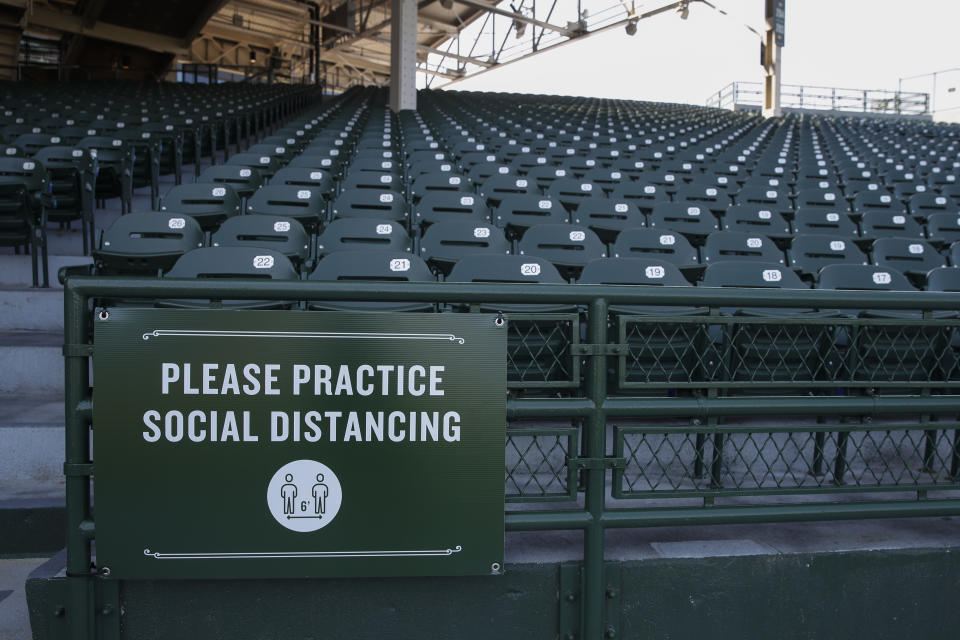Are local health officials on board with MLB’s plan to play in home cities?
A few weeks ago, I emailed the public health departments for 27 cities and/or counties that have Major League Baseball stadiums within their bounds. It was shortly after MLB announced that there would be a 60-game 2020 season starting on July 23. I asked the health departments if they had any concerns about the potential impact that a baseball team — particularly one that would be traveling to games in other states — might have on the prevalence of the coronavirus in their communities.
And if there was any scenario in which they might force the local team to relocate, which is an option MLB is aware it might have to consider, or cease operations.
The pandemic has thrust public health officials into high-stress, high-stakes efforts to mitigate risk amid an ever-evolving understanding of and blatant misinformation about the coronavirus. Limiting large gatherings, largely staying home, wearing masks around anyone outside of your household and self-quarantining after travel have emerged as some of the only tools to keep people safe until a vaccine can be developed.
Even without fans — and especially if they’re eventually admitted — professional baseball inherently involves flouting those precautions. Which is, of course, why the league is implementing a detailed array of protocols that impose as much monitoring and social distancing as possible while maintaining some semblance of the sport.
Still, it seemed important to hear from the public servants who aren’t professionally obligated to prioritize baseball games. Most local health departments (15) didn’t respond at all. Many more redirected me to a different government level (city instead of county, state instead of city) and plenty of those didn’t reply either.
Cleveland said no comment. The mayor’s office in Boston has spoken to the Red Sox and is comfortable with the plans. Alameda County, which includes Oakland, suggested a couple of extremely minor, mostly just semantic, modifications to the Oakland Athletics COVID-19 Emergency Action Plan, but was otherwise “pleased to share that the A’s may resume administrative operations and on-field practice as of June 26, 2020, and games without spectators may commence after July 3, 2020.” There was no mention of games with spectators.
Cobb County felt it was “premature to comment” because the health department there “hasn’t been involved in any reopening conversations with the Braves or MLB to date.” (This was on June 25.)

Both counties that host baseball teams in Florida — where COVID-19 cases are surging following premature reopenings now being rolled back — sent along similar stock responses suggesting best practices for individuals like staying six feet away from others and regular hand washing.
Three public health officials, however, were willing to talk to me about baseball.
‘They obviously want to do the right thing’
“I have to tell you, in my normal course of business, this is a very small percentage of what I do,” said Jon Snyder, Senior Policy Adviser, Outdoor Recreation & Economic Development, of Washington state. “But in a COVID crisis, all that goes out the window and everything changes.”
The United States’ first cases and deaths from the coronavirus were reported in Washington state, while baseball’s original spring training was still underway. Prior to the league-wide suspension of play, MLB was considering relocating the Mariners’ early season series in hopes that the outbreak would remain localized. Recently, the state has seen another uptick in cases.
Snyder has seen the 101-page document (and the original 67-page version, too), and although he hasn’t spoken to anyone at the league offices, he’s in regular contact with Mariners ownership via a weekly call with Washington’s pro sports teams.
For all of them, the requirement to return established by Gov. Jay Inslee is the same: A league-wide and team-specific safety plan approved by the collective bargaining unit that represents the players in that particular sport.
“So it’s not us that’s approving it, it’s the players. It’s similar to the approach we’ve taken with construction in our state,” Snyder said.
So does that mean as long as the MLBPA is comfortable with the league’s safety plan, Snyder is, too?
“Yeah, I am.”
MLB and the Houston Astros reached out to Dr. Umair Shah, executive director of Harris County Public Health, which includes Houston, after he was quoted in an ESPN story on May 19. He hadn’t heard from anyone in baseball yet, he said at the time, but was “more than happy” to talk.
“And the good news is that they obviously want to do the right thing, not just by the game and their players and the employees involved, but they also want to do the right thing by the fans,” he told Yahoo Sports.
Harris County has the highest number of coronavirus cases in a state where the virus is surging. Texas now trails only New York and California for total cases and Gov. Greg Abbott predicted that things are only going to get worse, at least in the short term.
Shah’s team has reviewed MLB’s protocol document and approves of it, and now, “Major League Baseball needs to not just talk the talk but walk the walk.”
“What that means is that if they’re championing health and safety for the players, they also need to champion health and safety for the communities in which those teams play,” he said.
He wants baseball to be taking into account the community context, to be flexible with their plans and prepared to alter them as necessary and to be aware of the powerful optics.
“If community members can’t get tested and Major League Baseball can, well that’s a mixed message to the community,” Shah said.
If the health department tells the community to limit gathering sizes regardless of personal reasons, then sports teams shouldn’t be selling tickets to fans. That’s a mixed message. If members of the community are told to wear masks and stay six feet away from each other, baseball players should as well. Otherwise, that’s a mixed message, too.
For now, Shah approves of the protocols and says he chooses to be an optimist about how this all could play out, believing that players will position themselves as COVID-precaution role models and that the sport will ultimately be good for the psyche of the country.

And even though Harris County lacks the necessary testing capacity — and Shah had to beg the Federal Emergency Management Agency for an extension after the administration threatened to pull support for COVID-19 testing — he doesn’t begrudge the league their access to robust testing for largely healthy athletes.
“As much as the optics might be one thing, the pragmatist in me says, those aren’t going to be impacting testing here locally, because it’s obviously being sent somewhere else,” Shah said.
‘The frequency is very ambitious’
“I’ve seen it and I’ve read it and I’ve provided feedback,” said Dr. Fredrick Echols, the Director of the City of St. Louis Department of Health, about MLB’s operations manual. After reporting its largest single-day increase in COVID-19 cases this week, St. Louis County is considering re-closing or reducing capacity of local businesses.
Echols’ feedback centered on the specific testing platforms that the league intended to use, whether they would be sufficiently accurate as to not create confusion from false results, and whether the league could meet its own demand.
“The frequency is very ambitious,” Echols said when we spoke. That was before summer camps had even started and the testing cadence was almost immediately disrupted by delays from the holiday weekend.
Like Shah, he acknowledged that, realistically, MLB wasn’t taking resources that would have otherwise been available to the public, but he cautioned about the logistical lift of getting results in a timely fashion.
“A situation where you have a pandemic or you have whatever communicable disease that spreads relatively easily through respiratory transmission, it’s important for individuals to know their status,” Echols said.
“We’re working with the Cardinals, to make sure we ease into baseball,” he said. “As the mayor says, we’ve got to learn how to coexist with COVID. And so that means creating a new normal.”
Even though all three officials offered tentative support for baseball attempting a season in their jurisdiction this summer, they also offered abundant cause for apprehension.
“The concern I have is in our state, and other states, we’re seeing an increased level of younger adults getting the disease,” Snyder, the Washington official, said. “And I’m worried, because there’s fewer young people who have died from it, that maybe some younger folks are taking it less seriously.”
He referenced the Orlando Pride, which had to withdraw from the NWSL’s Challenge Cup tournament recently after multiple members tested positive for COVID-19 after reportedly being out at a crowded bar.
“In public health, that’s the most difficult thing to tackle is behavior change because these behaviors have become social norms,” said Echols, the St. Louis health director.

For now, at least, fans are effectively off the table. Snyder says he’s heard hypothetical plans to increase sports attendance gradually over the rest of the year. But that makes no sense to him.
“How can you say that? How can you gaze into the crystal ball on that?” he said. “We have to be responsive to the conditions on the ground.”
Spectators at stadiums are a stipulation of Phase 4 in Washington state. Many counties are already in Phase 3, but that doesn’t mean the next step is imminent. Snyder said that they still haven’t even finalized criteria for Phase 4.
“I have no reason to expect that any part of our state will enter that Phase 4 this summer,” he said. “Talking about games with spectators with any kind of certainty right now seems very premature.”
What would it take for health officials to step in?
MLB is highly motivated to finish a season once it’s started for the sake of reaping the postseason broadcast revenue. But concern remains that local governments could make that impossible if strict stay-at-home orders are re-imposed at some point this summer or if policymakers take specific issue with sports in their jurisdiction. And so I asked each of the public health officials what, if anything, would cause them to close their city, county or state to baseball.
“One thing that would really get my attention is if we saw a super-spreader event at an outdoor sports game,” Snyder said. “We have very clearly documented incidents of outbreak events happening at food processing plants, in church, there’ve been issues in incarceration settings. If you were to add sporting activities to that list, that would really immediately get our attention.”
On the other hand, in St. Louis, Echols said “it wouldn’t necessarily, absolutely have to be connected to Cardinals.”
“But if we’re seeing a resurgence of cases in our community,” he continued, “our large venues would potentially have to shut down. We’re looking at it from a community-wide standpoint, and if we’re seeing cases continue to increase, spikes in cases, we will shut things down.”
He stipulated that any action would be discussed and cleared with the Cardinals and MLB, stressing the importance of data transparency and education — “make sure they understand the ‘why.’”
In Harris County, Shah said that, frankly, there are more significant issues jeopardizing coronavirus containment than sports leagues restarting. (Namely, that this public health crisis has become a polarizing political issue, which creates confusing messaging and alienates people.)
But that, “I am concerned about every role that every entity plays in fighting a pandemic.”
“If the trends in our community continue to move in a negative fashion, or we see an increase in cases or hospitalizations, and we wind up having to really dial things back,” Shah said, “I would say that Major League Baseball would need to take that into incredible amount of consideration as it makes its decision to continue to move forward.”
Hannah Keyser is a reporter at Yahoo Sports. Have a tip? Email her at Hannah.Keyser@yahoosports.com or reach out on Twitter at @HannahRKeyser.
More from Yahoo Sports:

